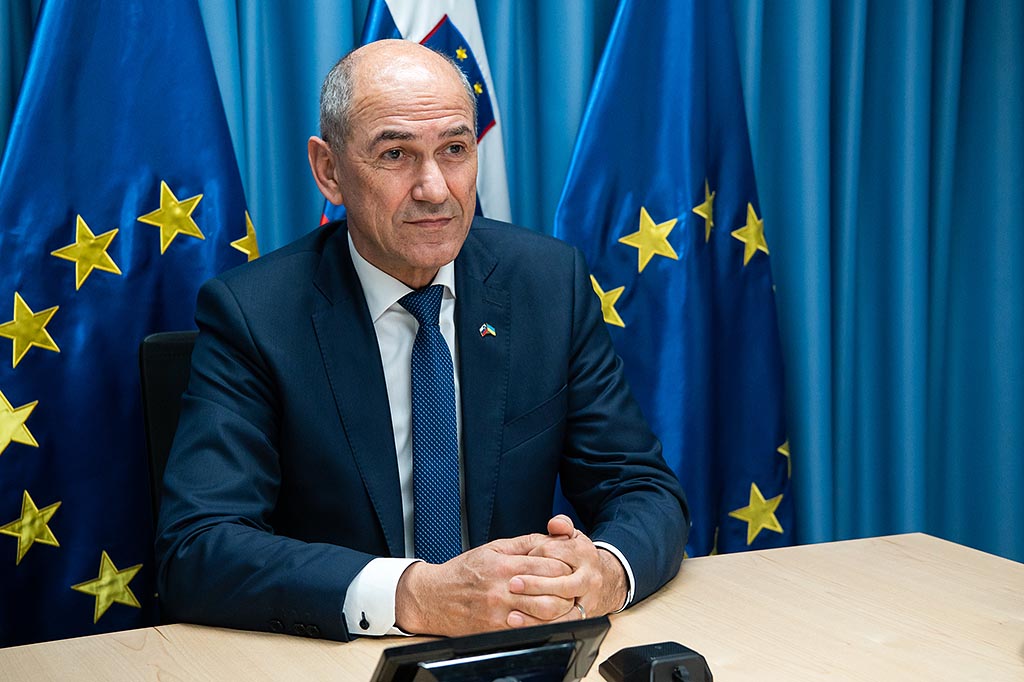By: UKOM
Prime Minister Janez Janša was a live guest on a Euronews TV programme, where he spoke with Anelise Borges about the situation in Ukraine and the European response to the crisis.
In the programme, the Prime Minister first said that it had been a month since he and the Polish and Czech Prime Ministers travelled to Kyiv. “We were the first foreign delegation to go there after the Russian aggression started. Our trip there was a message of hope. We wanted to tell Ukrainians that they had not been abandoned. I am pleased that, after our visit, other colleagues have followed suit. I am especially glad that the President of the European Commission, the President of the European Parliament and the High Representative of the Union for Foreign Affairs and Security Policy, Josep Borrell, also travelled there. European diplomats are back after we first sent there our chargé d’affaires to join the Polish Ambassador, who was left alone. I think the feeling in Kyiv is now much better regarding foreign support. But the situation is still difficult. Despite the efforts that we investing in real support for Ukraine – humanitarian, financial and military aid, which is particularly important – I do not think that we are not doing everything we can. We are still not sufficiently united to make Ukraine stronger,” said the Prime Minister.
In his words, the European response to the Russian aggression was more united and stronger than the Kremlin had expected, but on the other hand not strong enough. “At the beginning of the tragedy, when Russia invaded Ukraine, some European friends did not believe that Ukraine would resist and thought that the government and the president would flee the country and that the Russians would take over Ukraine within a week. I told them that this would not happen. If the nation is ready to defend themselves and if the political leadership is united, and the Ukrainian leadership is, there are no differences between the president, the government and the opposition, and that is the key factor, and such a people, a nation of almost 40 million, cannot be defeated, regardless of the might of the invading army,” said the Prime Minister. He added that we must focus on military aid to Ukraine, “otherwise this war will go on, and it affects everything, including the European way of life. The Ukrainians are also fighting for us. The Russian aggression will stop when Ukraine is strong enough to stop the Russian army,” added the Prime Minister.
In relation to the visit of the European Commission President to Ukraine, Prime Minister Janša said that her visit was important and could change the situation. “Not everything in a war is decided by arms, although weapons do play an important role; the power of heart and the strength of people defending their country are far more important,” he said. “Any glimmer of hope, a strong signal that they belong to the European family, helps,” he explained. In his words, the European Commission is not really a decisive factor as the enlargement requires the consensus of all EU Member States. “For some countries this is a difficult issue, but the majority of the EU Member States support a fast-track approach to the membership of Ukraine, Moldova, Georgia and the Western Balkan countries. By now we have realised that our response to strategic issues had been weak; it is obvious that if the EU does not enlarge, somebody else will, but that will not bring more peace and security to the European continent,” he told Euronews.
The Prime Minister also answered questions about the Hungarian Prime Minister and his response to the Russia–Ukraine crisis. “I do not see that Hungary is supporting Russian aggression. They condemned the aggression. Hungary also agreed with all the sanctions; otherwise it would not be possible to adopt the packages of sanctions. But they have some problems regarding their minority,” he explained. Prime Minister Janša went on to say that, in his opinion, when a country is attacked, is in war, when people are dying, we should abandon other things and concentrate on saving lives. “What matters are priorities. When speaking about enlargement and the European perspective for the countries of the Eastern Neighbourhood and the Western Balkans, Hungary has always supported the enlargement. The Commissioner for enlargement comes from Hungary and he is doing a good job regarding the enlargement,” he added.
When asked if there is any stopping Russia’s President Putin, Prime Minister Janša replied that Ukrainians were now trying to stop him. “If scenario A had played out, in which, when the aggression started, they believed that Russia as a military might would occupy Ukraine in a few days, I am convinced that the next country to be attacked would be Moldova, followed by Georgia and the Western Balkan countries,” explained Prime Minister Janša.
Source: gov.si
